The tarot community is filled with amazing people, all working with their cards in different ways… some as artists, some as healers, some as activists, historians, storytellers, or philosophers. Today, I am so excited to introduce you to a tarot reader I’ve long admired. Writer, performer, activist and tarotist Leah Lakshmi Piepzna-Samarasinha of Brownstargirl Tarot has been reading the cards for twenty years, combining intersectional politics, community organising and radical folk healing in the most incredible ways. When I first found out I was gonna be writing this column for Autostraddle, the first thing I did was email to ask for a little of her time.
I mean, could you honestly resist a reading from this person?
Cranky, compassionate intuitive counselling by a queer, cis femme of color with a chronic illness and a brokeass background who understands systemic oppression.
[…] My mom raised me to know that listening deeply was just another thing that people could do, and comes from a tradition of tough ladies who survived by their sixth sense.
She had me at ‘cranky’ and as I read through her website it just kept getting better. I was secretly hoping that I might be able to ask Leah to fling a few cards my way during our interview time. As it happens, Leah had so much to share with me, so much wisdom and compassion and philosophy, so many years of experience in seeing how tarot and intuitive counselling can empower marginalised communities… that we ran out of time for anything like that.
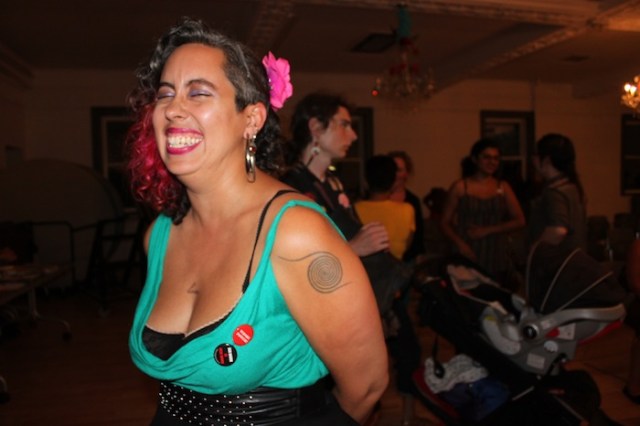
Leah talks fast and our interview was an hour long — please know that this article cannot possibly do justice at all to her impassioned ideas and thoughtful, joyful storytelling.
We started off discussing how she first starting using tarot in her daily life.
The way I got into tarot was… well, I was 19 years old and honestly? I was this young, queer, survivor of colour who was just finding herself and I had just got a scholarship and moved to the middle of New York in the early ’90s… and I was having a really hard time. My mother had been diagnosed with terminal cancer, I had finally left home after waiting my whole life to escape a family situation which was like… complicated and great and abusive… the girl who was my first girlfriend who I was madly in love with was suicidal and I was like… “Wow! I’m having a really rough time!” And I was just in the middle of that really white riot grrrl scene and a really straight students-of-colour activist scene, where everything was supposed to be, you know, really fun, I was just struggling and feeling really isolated and dealing with all of these really heavy things.
And I got my first tarot deck that year — I spent a lot of time going to bookstores, you know, in New York there were all these bookstores that stayed open all night, and I would just have this circuit where I would go around and read standing up in the bookstores because I couldn’t afford to buy the books, and I started reading [tarot veteran] Mary Greer, and developing my understanding of tarot and also numerology, and it was just so comforting. I could see that I was having like ‘a Hanged Man year’ or ‘a Death year’ or that I was totally the High Priestess at that time, and so on, and everything really just started to make sense. Like, this wasn’t just a bunch of random shit just coming at me — there was a whole story happening, and this whole system of archetypes that I could draw on, and I can also see that this is me as being part of a story that I’m in, and I have choices, and I can work through these challenges, you know?
So I started reading for myself, and in the middle of feeling like this really wackadoo, isolated, depressive person, it was really comforting to be on my own and be like this witchy, mystical individual person. And I would go to the park and read my cards and give myself this kind of counselling that was also really accessible and affordable to me.
As well as reading tarot, Leah is an active community organiser, involved in a whole range of radical social justice projects, such as Mangos with Chili (‘the floating cabaret of queer and trans people of color bliss…’), the Bad Ass Visionary Healers, and so many other organisations that I just couldn’t scribble down fast enough.
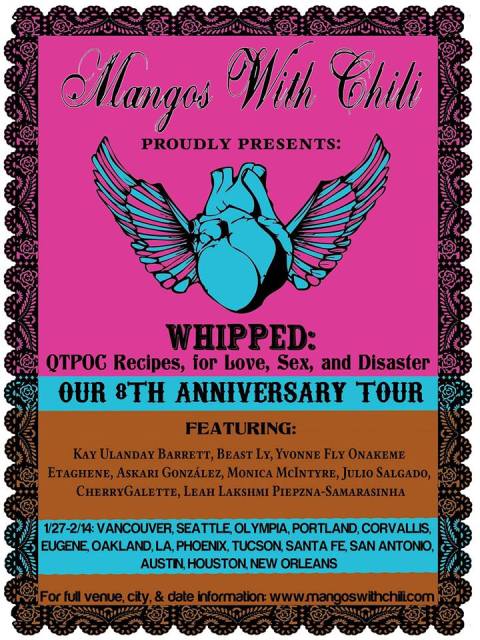
Artwork by Millan Figeroa
I was interested in the intersection between Leah’s spirituality and her politics, and we talked a lot about how Leah’s approach to tarot and the ways in which her intuitive tarot practice informs and supports — and actually, is integral to — her activism.
It all really makes sense for me, because you know I’m a writer and a performer and a curator and also a community organiser, and for a lot of people doing conventional activism it can feel like the witchy, spiritual, healer worlds are completely in a different room from being a creative person, or being an organiser, and I’ve been thinking a lot lately about how connected they are… and that makes me think about one of the organising principles of the Allied Media Conference (which is this progressive feminists-of-color media conference I do a lot of organising with) which is ‘we begin by listening’.
One thing we’re doing within this activism is this focus on building, rather than on reacting, and on our own power as oppressed people to create our own amazing solutions… and two years ago when I started thinking “right, I’m gonna do this tarot thing as an actual business,” those worlds really started coming together, and I actually got them tattooed on my arm.
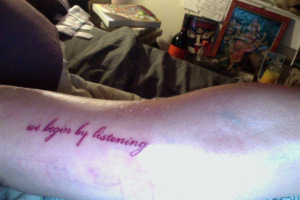
It really made me think about how the way that I approach all of those things is by really listening to people where they’re at, whether that’s a client asking me what the fuck is going on, or if it’s in the healing justice and transformative justice work that I’ve done… again, it’s a process of really paying attention to what’s really going on in our communities and really listening. And also when my co-director and I were rethinking how we describe Mangos with Chili, we were talking about how we really think of what we do as creating a healing space which is really deeply spiritual. So for example each year we do this show called ‘Beloved’ which is focused on our queer and trans people of color ancestors and people we’ve lost to hate crimes and violence, and like, we didn’t even think about it, it was like “of course we set up this giant altar every year!” but of course not every performance artist does that.
I guess for me, there’s this thing of – after my own experiences when I was 19 and isolated and depressed and finding myself through the tarot and now twenty years later – using tarot as a tool with oppressed people and communities, and thinking of it as a way for us to collectively get clarity and figure out situations that are really painful and complicated, and just to cut through the bullshit. And so it really is this process of just deeply deeply listening and paying attention to what’s really going on. Because of course as oppressed people, a lot of the time we’re taught that our bodies and our intuition are not to be trusted and that we should just go work our jobs and do what the powers that be tell us to do, and so I really believe that it’s a deeply revolutionary act to work with our intuition and to work with what we know.
And also you know for so many communities of color, using our spirituality and intuition has always been part of our revolutionary practice — I mean, spirituality and religion can of course be used to oppress, but in so many cultures these practices have given us so much strength, and then obviously in turn have been ripped off by this very white, western idea of spirituality.
So our spirituality and our politics aren’t necessarily separate, you know? And that’s why I don’t really see my tarot practice as this silly thing, or this party trick – it’s so important to my work with communities.
So, of course I wanted to know, what was that very first tarot deck you picked up in the all-night bookstore in NYC twenty years ago? And what about the decks you read with now – how do they inform your practice?
The very first tarot deck that I got was the the Daughters of the Moon Tarot, which is this very 80s-feminist round deck, and there are lots of women of colour in it.
Although I’m pretty critical of a lot of this stuff, I’m also really grateful to the 70s feminist spirituality movement for this idea that we can re-imagine tarot — like, these things are all archetypes, but they don’t have to be drawn in these ‘white, boy-gets-the-girl, female-negative, male-positive’ ways — we can re-imagine tarot in ways that work for us. And though I don’t necessarily agree with every interpretation of every goddess in that particular deck and so on, when I was 19 it was just really what I needed. So it really shaped my understanding that I didn’t have to like walk around this very white non-intersectional narrative of tarot, I can have my own relationship with these archetypes, and for years it was the best deck that I’ve found.
And besides, tarot’s origins are from Romany people — people of colour — and it’s really funny to me that when think of tarot these days we’re imagining those Rider Waite cards, you know, there’s a guy in a robe and all these knights and kings and queens and so on, and I feel like in my own tarot practice, I’m always reaching for before that.
And what I do with the cards and in a reading is that I don’t just sit down and go “okay this is what the book says,” I’m bringing my own way of looking at each card, and using my own intuition, and being in touch with the energy of the person I’m sitting with, and my own relationship with my own spirituality, and it’ like ‘okay in this moment, with you.
The deck I read with most of the time now is the Collective Tarot, and I’m just really grateful for those cards. It’s just so great to have a deck that is black and brown and has people with disabilities and queer folks and gender non confirming folks, and it’s also like a living document, you know? And although it’s out of print and they’re probably not gonna make another one, I feel really excited that there might be other radical tarot decks that come out… for example I’d love to see a black feminist tarot deck, and I’d love to see an indigenous tarot deck… there are so many different ways that we can interpret these cards.
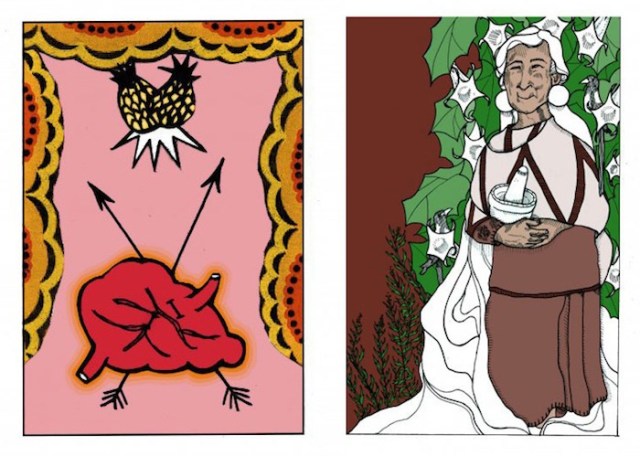
Leah shared these two images from the Collective Tarot – The Lovers and The High Priestess
We have personal and collective power, you know I don’t believe that the future is like already written — that would be terrifying, right?! So when I was writing up my website, and focusing on this way that I really think tarot can be political and is political, it was important to me to get across the idea that we create the future with our choices, and keep coming back to this idea that even though there are these systems that oppress us, and even though we also don’t control life — the house collapses or a partner leaves us or we suddenly have a different relationship with our bodies… still, we have choices. We’re all such magical beings! It’s like ‘I am not just this person that fucked-up shit is happening to – I’m a hero, on a journey!’, and tarot helps us to actually tell that story and say ‘look — here’s you, and here’s the stuff that’s going on around you, and look, here are some choices!’
One thing all tarot readers have to deal with sooner or later is this issue of boundaries. I mentioned how I personally prefer not to read for people in my immediate community, simply because for me that crosses a personal boundary — and asked Leah about where her own boundaries lay and how she maintains them.
Yeah right! Because you know, most of the people I read for are maybe one or two degrees of separation from me, so it can be hard right in the middle of this community, being the tarot reader. And if I really had to pick a central community that is closest to my heart, of all the communities I read for, it would be the queer femmes of color, those are the people I feel the closest to, that I love so much, and so there it’s like no degrees of separation! So maintaining those really strong, clear boundaries really is this big thing. But with the tarot, and also going back to my days working as a rape counsellor, and then moving into work doing transformative justice in communities of color, I basically feel like I have this external hard drive with everyone’s stories, which just go into the vault.
I do have really firm boundaries, but it can be like this catch-22 situation where I really want to read for people who are working in these particular marginalised communities. It’s something I can give, something that has value. Because one thing I’ve come to see, especially in the past couple of years, is that people really need these spaces where they can come and talk about what’s really going on, and not be worried that I’m gonna be fat-phobic, or racist, or look down on them because they have a disability or something with their mental health. And as someone who has identified as ‘crazy’ and as a survivor myself, and as someone who has walked between worlds, I really get that need to have a space to deal with this stuff that is spiritual, not clinical, and that’s something I really feel I can offer to people. It’s something that just doesn’t exist so much in the mainstream mental health services, where it tends to be more like western talk therapy, which is like “okay, talk to me once a week”, and that’s it.
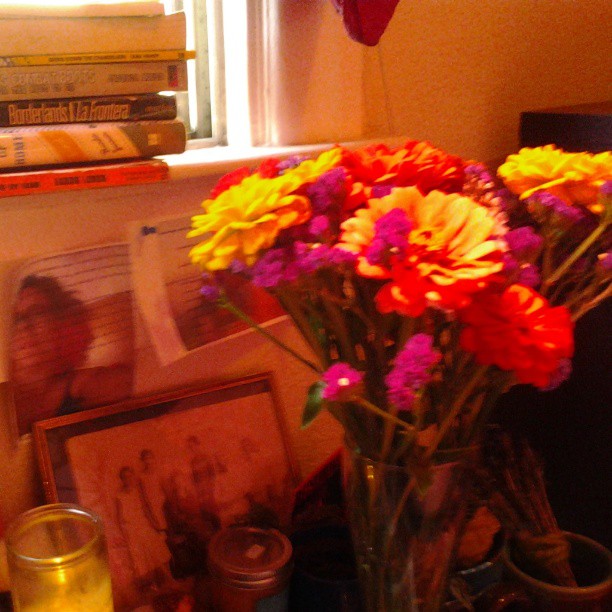
So providing this spiritual space where people can work through their stuff, I feel like that’s something I can offer to people. I use my intuition with these cards, I’m using my spirituality, I pray before I work with you, we do some breathing and somatic exercises to ground us, I ask my ancestors and the land we’re on for assistance in helping to give you a reading that is useful, and then we can really just sit together and be in this ‘okay, tell me everything that’s going on’ place. It’s political because it’s an accessible form of healing, that brings in spirituality, that brings in ancestry, and that can cut the shit a little bit, right? With the cards I can be like ‘okay, so this is what the cards are showing me, does this ring a bell?’ and so many people are like ‘holy shit, this isn’t just something crazy that’s happening to me, I can see it more clearly now, and I can see my challenge and see my choices.’
It really took me a while to come out of the broom closet and be like ‘yeah, I’m a healer, and the way that I heal is I’m an intuitive healer, and this is something that’s really of interest and use to the community’, and really it took me so many years… recently I was at Safetyfest (which is organised by Communities United Against Violence, a queer and trans anti-violence organisation) where there was performance and workshops and all this stuff about how we can create more safe spaces within our communities and they were offering free healing to all the people that were there, and I was able to offer tarot… and it felt so amazing to be sitting there next to someone who was offering herbal therapy next to somebody who was offering somatic therapy next to somebody who was doing reiki and acupuncture and offering it for free to all these queer and trans folks… and I really feel right now like there’s a new wave right now of folks who are tarot readers and intuitives and herbalists who are coming out of the healing justice movement right now and it’s a real change from even like six years ago when it felt like I really only knew only one other person who was queer and offering this stuff…
It’s been so amazing to see so many people who are able to articulate that intuitive counselling and these types of healing are really of benefit to our communities. And I’m really influenced by this idea that divorcing health and healing from our work is actually not a way of making the work more efficient… and I’m thinking now about this article ‘Communities of Care’ I read a couple of years back by [queer femme yoga teacher] Yashna Maya Padamsee — she was making the point that we talk about self care as if, like, ‘we work 80 hours a week and then we take a bubble bath,’ but what would it be like if we actually changed our whole movements, so there’s food at every meeting, there’s health care at every meeting, we ask each other how we’re doing, there’s flexibility, as in, ‘you’re freaking out today? Well you take a day off and I’ll handle this, and you’ll take over when I’m freaking out!’ And I really feel like this this way of thinking about healing justice has really informed the way that I do tarot.
To round off our interview, I asked Leah for the three personal qualities she feels makes her a great tarot reader.
Oh wow. Well — I’m totally non-judgemental. There’s nothing you can say to me that I’m actually going to shame you for.
The intersectionality — you know, my tag line is ‘snarky, compassionate intuitive counselling by a queer, cis femme of color with a chronic illness and a brokeass background who understands systemic oppression’ — and when people go to therapists and they’re thinking ‘oh my gosh, is she gonna get that I’m poly, or my whole Mexican family,’ or whatever, and it’s like, I can’t promise to get everything, but you’re not neccessarily going to have to explain all of the things to me.
And compassion — I have a deep compassion for the people that I work with and when people say thank you, I say no, thank you, because I feel like we’re actually healing together, it’s not a one-sided experience. I feel so respectful of my clients as they’re coming into their power… you know, we’re all human beings in these crazy situations together, and our struggles, and how we’re trying to figure it all out together the best way that we can. So yeah — big respect, and so much compassion.
If you wanna know more about Leah, her tarot, her art and so much more, you can catch up with her at her tarot website, brownstargirltarot.wordpress.com, and at her bog, brownstargirl.org.
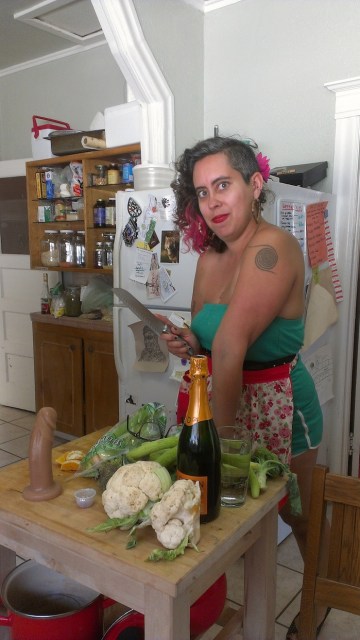



Leah has been writing gorgeous things for years, so I finally had a tarot reading with her about two years ago. The outcome card was The Lovers and a week later I adopted my cat/soul mate Tiger. Still think about that a lot.
Seriously, like, I needed to read this and I needed to read it today and thank you. I’ve recently gotten back into tarot, and I’ve been drawing connections to my philosophies and politics. However, the people I usually talk with about my philosophies and politics don’t really jive with my interests in tarot, numerology, and astrology. It’s refreshing knowing these connections have been made, and now I have a tangible point for digging more into this. <3
Totally. Leah really articulates the very real connection between spiritual wellness and the health and strength of entire communities – she is so inspiring! I find it incredibly sad
I did mini tarot readings to raise money for an anti cuts group a few years back and got a nasty backlash from other activists on Twitter – the message was like ‘WTF – get this weird shit away from our activism’, which is really sad. I love how Leah not only combines her tarot practice with her politics but actually exemplifies her activism *through* tarot.
This is gorgeous and super timely. <3
Leah sounds so cool. I’ve never entered the world of tarot, but after reading this and Leah’s approach I would consider getting a reading from her!
You should totally do that!!
This is such great timing in my life to read this. Thank you for being rad, Leah and Autostraddle! <3
Leah is really amazing! Loved this piece.
Leah is so awesome! Thanks for doing this interview, Beth. I started reading her blog right after, and I actually didn’t realize that I’ve read her work in various anthologies. Raaaad.
She really nails it for me, when she was talking about why tarot is important to her, as an accessible, nonjudgmental way of working through her shit, and helping others work through theirs. Especially in marginalized communities. Sometimes I have this self-consciousness about my tarot practice, like it’s just this silly new-agey thing I dabble in, but her words are so encouraging and inspiring!
I can’t believe I missed this article! Leah’s work is so awesome and this is a side I had never seen before.
Thanks for introducing me to this powerful, healing human being!